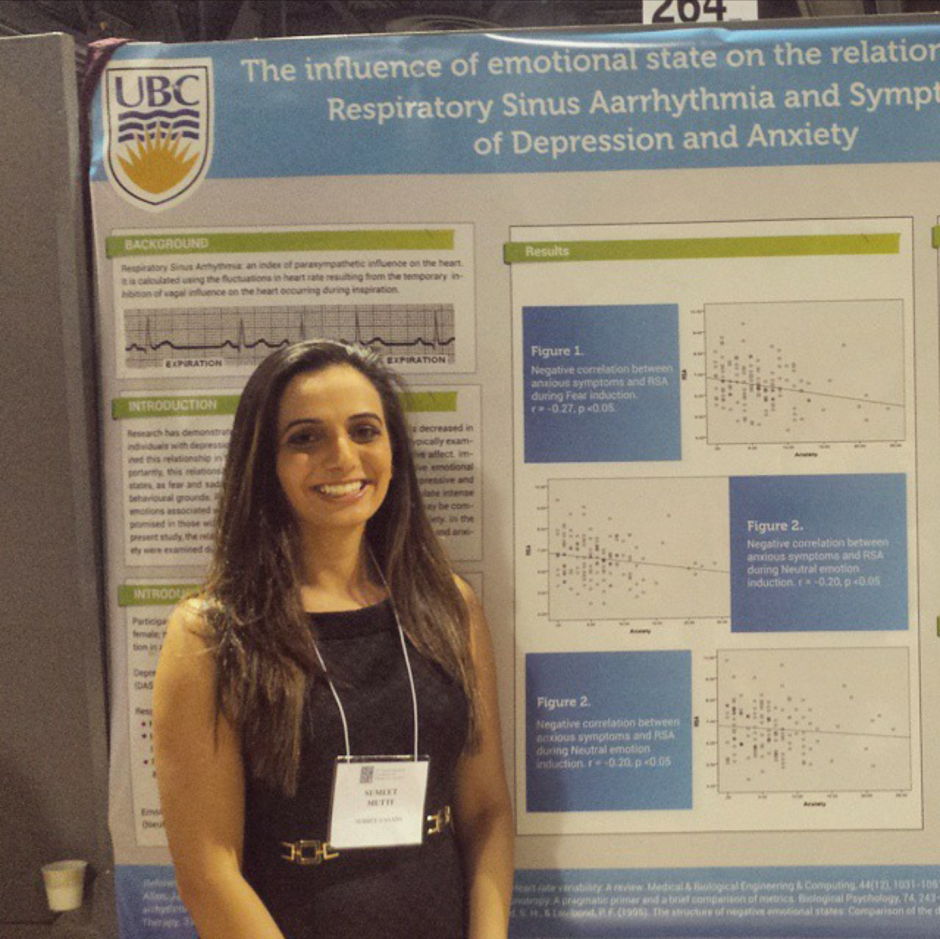
The NSERC Undergraduate Student Research Awards (USRA) give undergraduates students the “opportunity to gain valuable work experience” (UBC Student Services). With an NSERC USRA, a student conducts research with a professor over the summer. UBC’s Psi Chi executives sat down with Psi Chi member Sumeet Mutti, who has won NSERC USRAs in both the Faculty of Medicine and the Department of Psychology at UBC.
Which labs did you work in, and with what faculty members?
[I held my first USRA] in summer 2015 in the Neuroscience of Vision and Action Lab with Dr. Miriam Spering (Department of Ophthalmology & Visual Sciences, Faculty of Medicine).
[I held my second USRA] in summer 2016 in the Attentional Neuroscience Lab with Dr. Todd Handy (Department of Psychology, Faculty of Arts).
Through these awards, what research did you do or are you doing?
[With Dr. Spering], I learned how to use eye trackers in order to conduct an experiment comparing ocular-torsional and perceptual speed sensitivity in response to on-screen moving and rotating visual stimuli.
Presently [with Dr. Handy], I am helping code and analyze an experiment with several behavioural tasks examining executive functioning, while testing for mind wandering.
What is your long-term goal, research or otherwise?
I am starting graduate school in the Department of Psychology at UBC this September (2016), under the supervision of Dr. Todd Handy. I will be primarily studying the effects of mind wandering on cognition.
How have your research experiences contributed to this goal?
Working in Dr. Spering’s lab provided me with the experience of designing and conducting an experiment from the very beginning; [this was] an experience I had never gotten in my previous roles as a research assistant. I learned how to code an entire experiment in MATLAB, giving me a sense of self sufficiency and made me feel confident about pursuing a research career.
Presently in Dr. Handy’s lab I am coding my own experiments as well as helping my lab members design their experiments.
What has been the most valuable thing that you’ve learned during your research experiences?
While working in both Dr. Spering’s as well as Dr. Handy’s labs, I learned the level of discipline one needs to finish their tasks on time. Although 4 months seems like a long time, it is very important that you come up with a timeline of when you want the literature review done by so you can start working on your project. Because, before you know it it’s August and HSP is almost finished and you have yet to start collecting data!
How do you intend on sharing your research with others?
There is a work-in-progress manuscript for the project I completed while I was under Dr. Spering’s supervision.
The project I am currently working on in Dr. Handy’s lab will hopefully lead to a poster presentation at a conference.
Could you comment on any differences between applying to an NSERC USRA in Medicine versus Psychology?
There is a HUGE difference between the two faculties. Medicine bases their awards on the student’s research experience and their actual research proposal, whereas Psychology bases their decision primarily off the student’s grades. Medicine used to follow the grade criterion and has switched to research, only in recent years.
What advice do you have for students who are interested in applying for an NSERC USRA?
Apply, even if you don’t think you will get it! Most people don’t apply for the NSERC USRA, because it “sounds scary.”
This year, UBC’s Psi Chi chapter wants to help connect students with possible mentorship opportunities. If you’re a student and you have questions about Sumeet’s experiences with the NSERC Undergraduate Student Research Award, please email us at psichi@psych.ubc.ca. We can put you in contact with Sumeet.
– Natalie Wong and Brandon M. Woo
6 August 2016